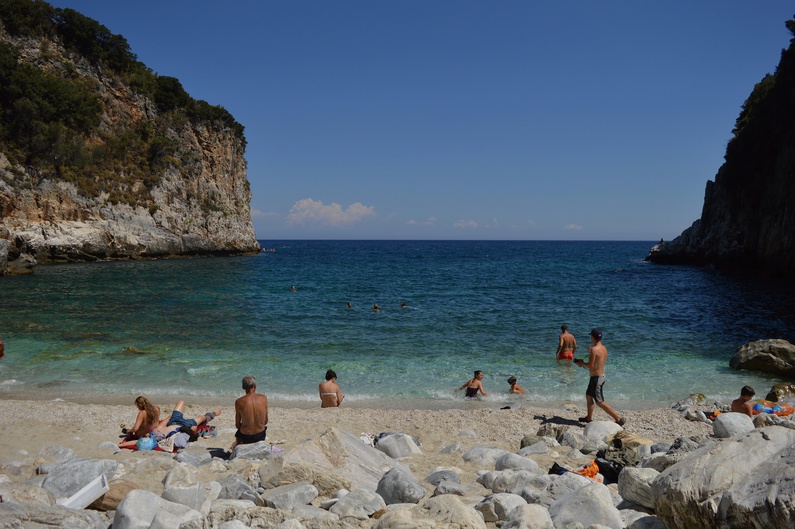
The Greeks you left behind
Published on
Over 200,000 Greeks have left the country since the start of the crisis to find work abroad. Research shows that one third of them plan not to return. But there are thousands of others who have stayed, either because they can’t leave, but more often because they don’t want to.
In the streets of Athens, there is an evident desire amongst young people to flee. It is understandable why; struck hard by the financial crisis, they feel like nothing seems to be improving. They feel that the state is not supportive of any business ventures, that there is stifling bureaucracy and that corruption is rampant.
“Greeks have become accustomed to anarchy,” says Lazaros, 31, an agriculturist and food scientist who just a few months ago launched his own business, Thirsty Fruits, for the production and trading of dried fruits, “Generally, Greeks are better off in Greece, where they can speak the language, know how everything works, and can operate under more competitive circumstances than they find abroad when trying to do the same thing there.”
 “If we all just get up and leave, then who will stay to fix this country?” wonders Nadia, 25 under contract employment for an accounting company. Nadia does not want to leave her life, family and friends in Athens. “This is what I am used to and I don’t want to change it just so I can earn more money. If I am financially prosperous but socially empty, what is the point of that?”
“If we all just get up and leave, then who will stay to fix this country?” wonders Nadia, 25 under contract employment for an accounting company. Nadia does not want to leave her life, family and friends in Athens. “This is what I am used to and I don’t want to change it just so I can earn more money. If I am financially prosperous but socially empty, what is the point of that?”
As hard as it is to leave your home and become an economic migrant, it can be even harder to stay. “Greece has a tendency to devour its own children,” says Nikos, 33, who works at a bakery and as a barman, having already held a number of similar positions, “We are the most educated generation this country has ever seen, yet we cannot exploit this huge brain power. We don’t have enough research centres to do so, and that pushes the problem of a brain drain further.”
Anna 28, is currently unemployed, as she has been for the past six months. Although she is thinking about migrating abroad, she says this will be her last option. “Greece is a wonderful place to live," she explains, "It is the state that makes everything more difficult.” Lazaros also shares this view when he outlines the challenges faced in starting his own enterprise; the negative climate, the hostility with which he was addressed, the lack of support or funding from anywhere. “Greece is generally an anti-business country,” he argues.
So why does anyone choose to stay? Nikos explains his view; “There are many things for which we should be grateful in Greece,” his radiant smile displays an optimism rare for his generation, “The perfect place does not exist anywhere. What matters is for you to be satisfied with who you are and the choices you make.”
Nikos has contemplated opening his own ice-cream shop, in order to take advantage of Greece’s famous ‘300 days of sunshine’. “Despite there being no funds, if you are not afraid to work, opportunities in Greece exist even now," he says, "What has destroyed us is this mentality of searching for the easy way out of everything.”
“It is the people who cannot compromise who emigrate,” adds Lazaros. He refers to people he knows who did not want to do something that wasn't relevent to their studies, those people who simply felt that their dreams were too big for anything a country like Greece had to offer: “Sure there are many Greeks who have succeeded abroad, but what about those who didn’t?”
He notes that there are many people with the skills and capital to venture into innovative ideas who remain inactive, afraid of taking risks. “I have seen people in the provinces loaded with ideas, who have the know-how to realise them, who aren't afraid to chase after their ambitions. This is very contradictory to the mood in Athens. Maybe because of the cost of life in the city, maybe even because working for a salary consumes you to the extent you have no time left to generate any ideas.”
 It has been said that anytime can be a good time to start a company, but why launch a business now, in a country that has recently trembled on the verge of bankruptcy? “Because now I have the time to think about it and devote myself wholly to it,” responds Lazaros, "It's about taking advantage of everything the country has to offer, about elevating Greece to a level that will make it globally competitive, that is referenced in the context of being a model to imitate, rather than one to avoid."
It has been said that anytime can be a good time to start a company, but why launch a business now, in a country that has recently trembled on the verge of bankruptcy? “Because now I have the time to think about it and devote myself wholly to it,” responds Lazaros, "It's about taking advantage of everything the country has to offer, about elevating Greece to a level that will make it globally competitive, that is referenced in the context of being a model to imitate, rather than one to avoid."
“Greece is a blessed country," Nikos concludes, "whatever you sow, you will reap from its soil, generating quality products. It just lacks the innovative business minds needed to take everything forward."
These young Greeks are reminiscent of the saying “those who are crazy enough to think they can change the world, are usually the ones that do.” They seem to have a different perspective on life itself, appearing to embrace the notion that they are the rulers of their own destiny, taking risks and seizing opportunities when they arise. They are the people who, instead of merely talking about ideas to revive the country, actually persist in taking action, despite all the challenges. It is these people who should be assisted in achieving their goals, because they will be the ones who will eventually stir things up, and change the country for the better.



